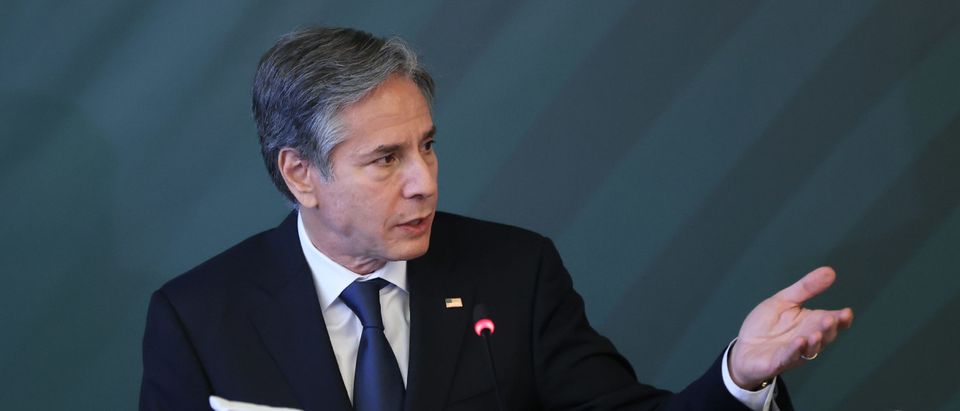Next week, in Geneva, Switzerland, it’s déjà vu all over again.
Are we at the start of a new Cold War between Russia and the United States as was evident when President Harry Truman’s Secretary of State, Dean Acheson, met in Paris in June 1949 with several European foreign ministers and Russian Foreign Minister Andrey Vyshinsky?
On Jan. 9 and 10, 2022, U.S. and Russian diplomats will discuss the current crisis involving Ukraine, where some 100,000 Russian troops are massed in at least four locations bordering the former Soviet republic.
Presumably the lead negotiators will be U.S. Secretary of State Antony Blinken and Russian Foreign Minister Sergei Lavrov. To prepare for these discussions, Blinken should study carefully Dean Acheson’s experience as described in the late Robert Beisner’s massively detailed biography, “Dean Acheson: A Life in the Cold War.”
In 1949, Truman and Acheson faced down the Soviet Union when it came to that Communist nation’s role in postwar Europe and, especially, Germany’s future. The Soviet Union’s leader, Joseph Stalin, fearing a unified Germany, initiated a blockade, later partitioned Berlin and made East Germany (the German Democratic Republic) one of its satellite states.
Germany remained divided until the Berlin Wall fell on November 9, 1989. German reunification followed in October 1990. The Soviet Union itself collapsed on December 26, 1991, with many of its constituent republics becoming independent nations looking more towards the democratic West than towards dictatorial Moscow.
Vladimir Putin has stated that the Soviet Union’s collapse was the greatest tragedy of the 20th century. Most freedom-loving people and nations see that collapse differently.
Ronald Reagan helped abolish the Soviet Union with his “peace through strength” policies. Beisner writes that Acheson came to appreciate that “[s]ecurity lay in strength rather than in negotiations.” Acheson recognized the importance of “situations of strength” that involved military, political and economic considerations. “Power, steadfastness, and western unity” were essential when confronting the Soviets.
We can expect Putin and Lavrov to behave today much like Stalin and Vyshinsky behaved in 1949. There will be plenty of bombast, misinformation and non-starter proposals, like a guarantee that no other former Soviet republics will ever join NATO.
Former Soviet republics such as Estonia, Latvia and Lithuania chose freely to join NATO; they were not coerced. Likewise, former Soviet satellite states such as Bulgaria, the Czech Republic, Hungary, Poland, Romania and Slovakia have also joined NATO, which is essentially a defensive, collective military alliance.
NATO hasn’t invaded offensively anywhere. The same can’t be said of Putin’s Russia.
Putin desperately fears losing Georgia (which he invaded in 2008) and Ukraine (a portion of which, Crimea, he annexed through military conquest in 2014). His clampdown on Belarus is yet another example of his strategy of hanging on to as much as possible of the former Soviet Union’s empire.
The Biden administration cannot look the other way and assume that enhanced economic sanctions alone will deter Putin from invading Ukraine. What’s at stake next week is precisely what was at stake in 1949 when Stalin and Vyshinsky attempted to promote their Communist, totalitarian ideology as an organizing principle for postwar Europe and beyond.
Acheson understood that the Soviet Union represented an “unbridgeable conflict” between “two communities with antithetical conceptions of decency.” As Beisner explains Acheson’s thinking, “[i]t had become imperative to defend a civilization built on liberty against one founded in tyranny, and how societies organized themselves was at the root of the matter.”
For Dean Acheson, his unswerving belief in economic and political freedom was the bedrock for establishing – in his words – the “environment in which the American experiment of life can prosper.”
While every effort should be made to avoid hostilities, we cannot ignore that Communist dictatorships are skilled at provoking confrontations, disseminating nonstop propaganda and fostering discord among their opponents. What Putin is considering in Ukraine parallels what China’s Communist Party leader Xi Jinping is threatening now in Taiwan.
Next week’s Geneva discussions – like those in Paris in June 1949 – will have lasting geostrategic implications. History tells us that totalitarian and authoritarian regimes respect only strength.
Blinken’s first encounter with senior Chinese diplomats in March 2021 went poorly. He was unprepared.
In a 1950 speech, Acheson said “we are children of freedom … [we] cannot be safe except in an environment of freedom.”
The world will watch Geneva closely. There is little room for error.
Charles Kolb served as Deputy Assistant to the President for Domestic Policy from 1990-1992 in the George H.W. Bush White House


